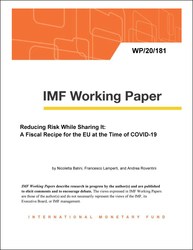
Reducing Risk While Sharing It: A Fiscal Recipe for The EU at the Time of COVID-19
Reducing Risk While Sharing It: A Fiscal Recipe for The EU at the Time of COVID-19
READ MORE...
Volume/Issue:
Volume 2020
Issue 181
Publication date: September 2020
ISBN: 9781513551920
$18.00
Add to Cart by clicking price of the language and format you'd like to purchase
Available Languages and Formats
| English |
Prices in red indicate formats that are not yet available but are forthcoming.
Topics covered in this book
This title contains information about the following subjects.
Click on a subject if you would like to see other titles with the same subjects.
Finance , Economics- Macroeconomics , Public Finance , WP , risk sharing , EU bond , EU risk
Summary
The COVID-19 lockdowns have brought about the need of large fiscal responses in all European countries. However, countries across Europe are differently equipped to respond to the shock due to differences in economic conditions and fiscal space. We build on the model by Berger et al. (2019) to compare gains from alternative mechanisms of EU fiscal integration in the presence of moral hazard. We show that any EU response strategy to the COVID-19 crisis excluding mutual financial support to member countries lacks credibility. Some form of fiscal risk sharing is indeed better than none, especially in presence of increasing sovereign default risk of some EU member countries. The moral hazard created by risk sharing can be hedged by introducing some form of fiscal delegation to Brussels. The desirable level of delegation, however, depends on its costs. When these are low, risk sharing and delegation are substitutes and it is optimal to opt for high delegation and low risk sharing. On the contrary, when delegation costs are high, centralization and risk sharing are complements and both are needed. Proposed arrangements at the EU level in response to the COVID-19 shock seem to reflect these basic insights by rotating around a combination of fiscal risk sharing and delegation in the form of fiscal spending conditionality.
Copyright © 2010 - 2026
Powered by:
AIDC



